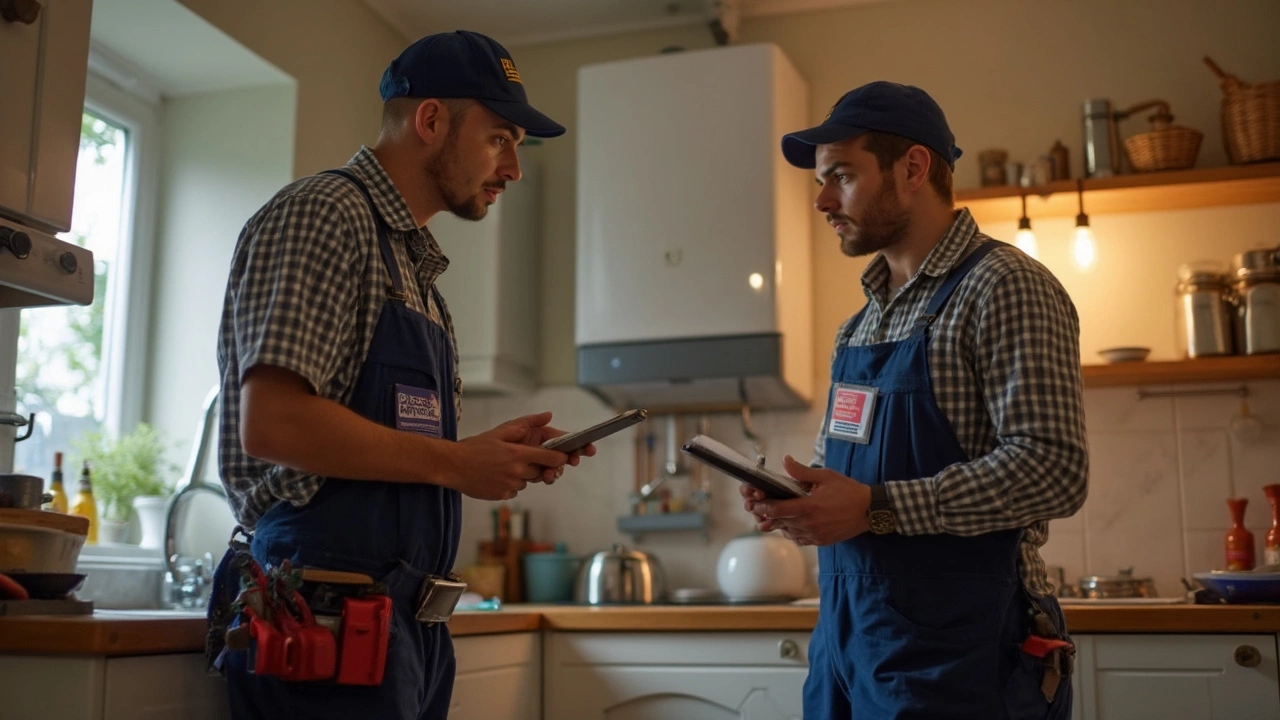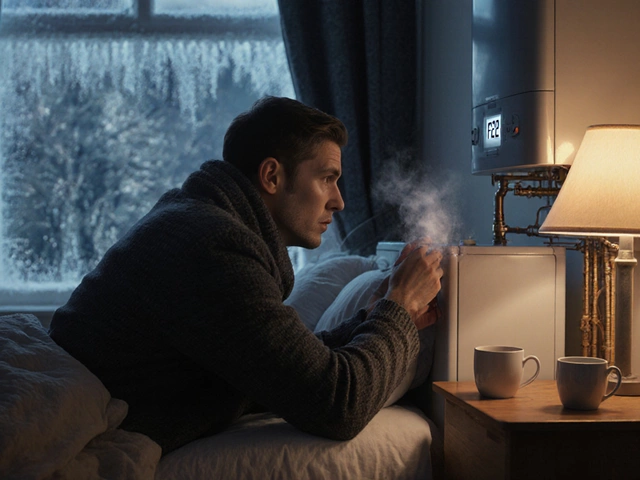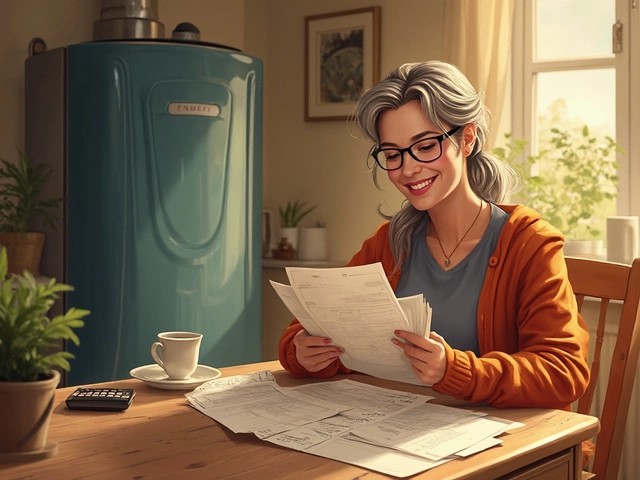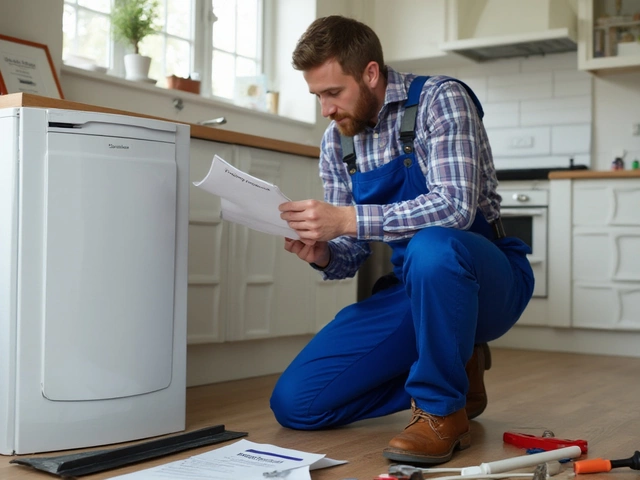Boilers are mysterious beasts to most people. The minute your heating stops, you’re probably digging up a phone number—but who do you actually call? A plumber, a heating engineer, or someone else entirely?
Here’s the thing: not every plumber is set up to repair or install boilers. Some are, but many stick to water pipes, leaky taps, or toilets. If you want your boiler sorted fast and safely, you have to know where the line is between plumbers and proper heating engineers. A lot of people assume it’s all the same gig. In reality, there are big differences (and serious safety rules) in the world of boilers.
Let’s cut through the confusion, lay out what plumbers can—and can’t—do with boilers, and help you figure out the smartest way to get your heat back on.
- What's a Plumber's Job, Really?
- Where Boilers Fit In
- Heating Engineers vs. Plumbers
- Gas Safety and Legal Stuff
- How to Choose the Right Pro
- Quick Tips for Boiler Emergencies
What's a Plumber's Job, Really?
People usually picture a plumber working under the kitchen sink, fixing leaks, or dealing with clogged drains, and that’s not far off. A plumber’s main gig is looking after anything that carries water or waste in your home. If it’s got pipes, taps, showers, or toilets involved, plumbers are the folks to call. They fit bathroom suites, fix broken radiators, install washing machines, and patch up burst pipes.
But when you talk about boilers, things get a bit murkier. In the UK, for example, plumbing courses focus mostly on water systems—not always central heating or gas. That means your friendly plumber might not be legally allowed to even touch your boiler, especially if it’s gas-powered.
Here’s a look at core jobs you can trust a plumber to do:
- Unblocking sinks and toilets
- Fixing leaking pipes and radiators
- Installing baths, showers, taps, sinks
- Moving or adding new pipework
- Setting up washing machines or dishwashers
It’s not that plumbers can’t learn to handle boilers—it’s just a separate qualification. In the UK, plumbers who want to deal with gas boilers need to be Gas Safe registered. Without it, they’re not legally allowed to service or install gas equipment. And it’s not just paperwork—messing with gas when you’re not qualified is genuinely dangerous.
To make it clearer, here’s a quick comparison table showing what most plumbers can do versus what needs a specialist:
| Job Type | Typical Plumber | Gas Safe Engineer |
|---|---|---|
| Fix a leaking tap | Yes | Yes |
| Fix a burst water pipe | Yes | Yes |
| Service a gas boiler | No | Yes |
| Install a central heating system | No (unless dual-qualified) | Yes |
| Unblock a drain | Yes | Yes |
Always ask what plumbing qualifications someone holds when hiring. If it’s about heat, hot water, or gas, check for heating or gas safety credentials—and don’t assume your regular plumber is automatically up for the job.
Where Boilers Fit In
Let’s clear something up: while plumbers and boilers both deal with water and pipes, boilers are in their own league. A boiler does more than just push water around. It heats up your whole house, provides hot water on tap, and often connects with complicated electrical and gas systems.
In the UK, about 22 million homes rely on a boiler for heating, and almost all of them run on gas. That’s a lot of systems that need careful maintenance—not just anyone can handle them. Plumbers are trained on water systems. If your radiator is cold or your boiler’s leaking water, a plumber probably knows what’s up. But when it comes to gas supply, ignition, or complex wiring, that’s when heating engineers step in.
Boiler repair falls in a safety zone where plumbing overlaps with gas regulations. According to the Gas Safe Register, "Any work on a gas appliance, including boilers, must only be carried out by a Gas Safe registered engineer, not just any plumber."
Here’s how the jobs usually divide up:
- Plumbers: Tackle water leaks, replacement of pipes, and basic heat controls.
- Heating Engineers: Fix broken boilers, replace boiler units, check flues, and work on gas connections. They’re legally required for gas work.
So what about multifunction pros? Yes—they exist. Some plumbers get extra training and get themselves Gas Safe registered, so they’re good to go for both plumbing and boilers. If you’re DIY-minded, sorry: UK law says you can’t attempt gas boiler repairs yourself.
Check out these numbers to get a rough idea of who does what:
| Type of Work | Plumber | Heating Engineer |
|---|---|---|
| Fixing water leaks | ✔️ | ✔️ |
| Replacing radiators | ✔️ | ✔️ |
| Servicing boilers (gas check) | ✔️ | |
| Installing new boilers | ✔️ | |
| Unblocking pipes | ✔️ | ✔️ |
Bottom line: If anything involves gas or the boiler’s main guts, call a Gas Safe heating engineer. If it’s just water coming or going, many plumbers can handle it. Always ask for credentials before anyone goes near your boiler.
Heating Engineers vs. Plumbers
If you’ve ever tried searching for help with your boiler, you might have noticed a jumble of job titles: plumber, heating engineer, gas engineer. Here’s where things get clear. Plumbers handle your water system—fixing leaks, blocked toilets, or installing sinks. Heating engineers work on your home's central heating, radiators, and, most importantly, your boiler. There’s some overlap, but their training and day-to-day jobs aren’t the same.
Think of it this way: most plumbers have the skills to sort out water pipes connected to a boiler—say, your pressure-relief pipe bursts, or there’s a leak under the tank. But when it comes to actually opening up the boiler, checking the gas supply, or fixing that annoying fault code, you need someone with specialist training and certification. In the UK, for example, only Gas Safe registered engineers (not just any plumber) are legally allowed to work on gas boilers.
Here’s a quick breakdown of who does what:
- Plumbers: Water pipes, taps, toilets, showers, tanks, and sometimes the water-side bits of your heating system.
- Heating Engineers: Boilers, radiators, central heating controls, underfloor heating, and any direct work on gas lines or appliances.
This handy table sums up some common jobs:
| Job | Plumber | Heating Engineer |
|---|---|---|
| Fix leaking tap | Yes | Usually, yes |
| Install boiler | No* | Yes |
| Service boiler | No* | Yes |
| Fit new radiator | Maybe | Yes |
| Bleed radiators | Yes | Yes |
*Some plumbers might be qualified, but most aren't certified for gas boilers.
The big takeaway: if your boiler is having issues, don’t just dial any plumber. Check if they’re trained and legally allowed to deal with boilers, especially if it’s a gas model. Look for proof of their credentials, not just a confident promise.
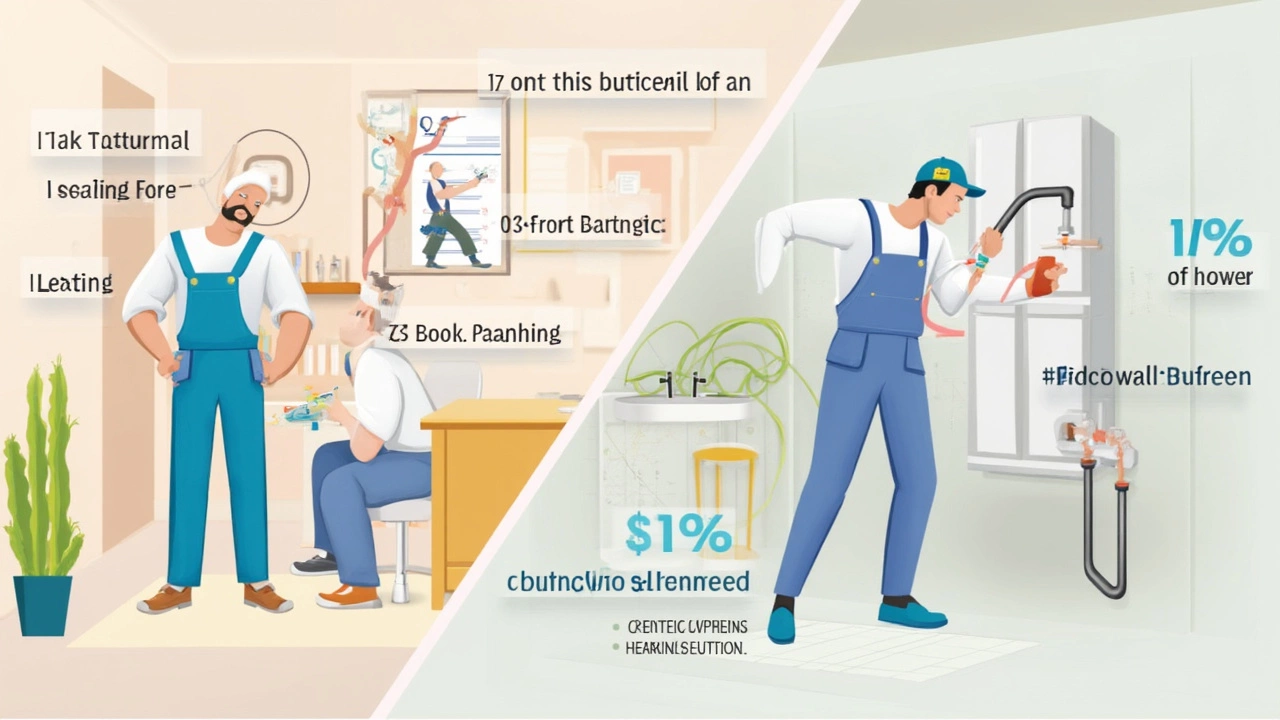
Gas Safety and Legal Stuff
When it comes to boilers, safety isn’t something you can ignore. In the UK, it’s actually illegal for anyone who isn’t Gas Safe registered to work on gas boilers. This rule exists for a reason, since dodgy work can lead to dangerous gas leaks, carbon monoxide poisoning, and even house fires. Even if a plumber is brilliant at fixing pipes, it doesn’t mean they’re allowed near your gas boiler unless they’ve got the right badge.
If you’re wondering what ‘Gas Safe’ means, it’s a government-backed qualification. You can check if someone’s legit by stopping for five seconds and asking to see their Gas Safe card—it’s that simple. Every professional working on boilers has one, with an ID number and the types of gas jobs they’re allowed to do. Don’t feel awkward about checking. The good ones expect it.
Here’s something wild—a study from the Gas Safe Register in 2023 found that about 1 in 5 people had let someone work on their gas appliances without checking their credentials. That’s pretty risky, considering faulty boilers are linked with more than 250 accidental carbon monoxide deaths in the UK in the last decade.
Key things to check before letting anyone touch your boiler:
- Are they Gas Safe registered? Check the official online register or look at their card.
- Does their registration cover your type of appliance? Not every engineer is certified for every job.
- Don’t be shy about asking for proof. Professionals are used to this.
Here’s a quick peek at the main rules around gas safety and boilers:
| Requirement | Who Enforces? |
|---|---|
| Gas Safe registration for boiler work | Health and Safety Executive (HSE) |
| Annual landlord gas safety check | Local council / HSE |
| Visible Gas Safe card on site | Engineer responsibility |
| Installation certificate after new boiler fit | Installer provides / Building Control notified |
If someone tries to dodge these rules, that’s a massive red flag. Play it safe—trust the system. Find someone who knows boilers inside out and puts boiler repair safety first.
How to Choose the Right Pro
You want your boiler back in action without a headache or, worse, a safety risk. But it’s not just about picking the first person you find online. Getting the right pro means checking credentials, experience, and, crucially, making sure they’re registered for gas work.
First step: always check if your professional is on the Gas Safe Register (that’s the UK’s official gas engineer list, but every country has an equivalent—look it up if you’re not sure). Gas Safe registration isn’t a bonus; it’s a legal must for anyone working on gas boilers. Ask for their ID card. The photo side shows their name and number; flip it for the jobs they’re qualified to do.
Here are practical tips to help you out:
- Search the Gas Safe Register (or your country’s list) online for their business.
- Look for boiler repair experience specifically—ask how often they actually work on your type of boiler.
- Get quotes from at least two or three people. Prices can vary a lot—even for the same job.
- Read reviews—don’t just trust the ones on their own website. Try sites like Trustpilot or Google.
- Double-check their public liability insurance—if something goes wrong, you’re covered.
- Ask for a breakdown of costs before anyone starts opening up your boiler.
To put things into perspective, check out this table showing what you should find out before booking a tradesperson for boiler work:
| Check | Why it Matters | How to Confirm |
|---|---|---|
| Gas Safe ID | Legal requirement & shows qualification | Ask for ID card & cross-check online |
| Specialist Experience | Ensures they actually work with boilers | Ask about recent jobs & brands they know |
| Insurance | Protects you & your property | Request proof of up-to-date cover |
| Written Quote | No surprise bills | Insist on it before the job starts |
| Reviews | Peace of mind & real results | Look at independent review sites |
If something feels off or you get pushback on any of these checks, move on and find someone else. There are plenty of legit certified pros—don’t gamble when it comes to gas work in your home.
Quick Tips for Boiler Emergencies
If your boiler suddenly stops working or starts making weird noises, don’t panic. There are a few things you can try before calling in a professional. Most importantly, don’t mess with anything if you smell gas or see signs of a leak—turn off the main supply, leave the building, and call emergency gas services right away. Boilers can be risky if you ignore warning signs.
- Check the basics: Make sure the power supply is on and the thermostat is set correctly. Sometimes someone has just knocked the dial by accident.
- Reset the boiler: Look for a reset button on your boiler panel. Most modern models have one, and a simple reset can clear a temporary fault.
- Bleed the radiators: If your radiators are cold at the top but hot at the bottom, air is probably trapped inside. Bleeding the radiator with a key can get things working again, but do this with care—hot water can spurt out.
- Check the pressure: Boilers often stop working if water pressure drops too low. Most work best between 1 and 2 bar. If your gauge is in the red or not moving, you can usually top it up using the filling loop, but always check your boiler manual first.
- Look for error codes: Many modern boilers display an error code if something’s wrong. Snap a photo or jot down the code before you call for help—it makes diagnosis much faster.
A lot of people make the mistake of ignoring warning signs, but quick action can save both money and hassle. Data shows that early intervention—like checking your pressure or bleeding radiators—prevents about 40% of unnecessary callouts to boiler repair services every year.
| Emergency Sign | What to Do |
|---|---|
| Smell of gas | Turn off supply, leave, and call emergency line |
| Loud banging noises | Switch off boiler, contact a qualified technician |
| Low pressure warning | Top up water, only if comfortable and safe |
| No hot water or heating | Check power, thermostat, and reset |
Keep your boiler’s manual somewhere handy—half the time, a quick check there can either fix the issue or help you sound like you know what you’re talking about when the engineer arrives. And if you ever feel unsure, it’s always safer (and cheaper in the long run) to call someone with the right gas safety registration.

